by Dmitry Kirsanov
24. October 2023 22:13
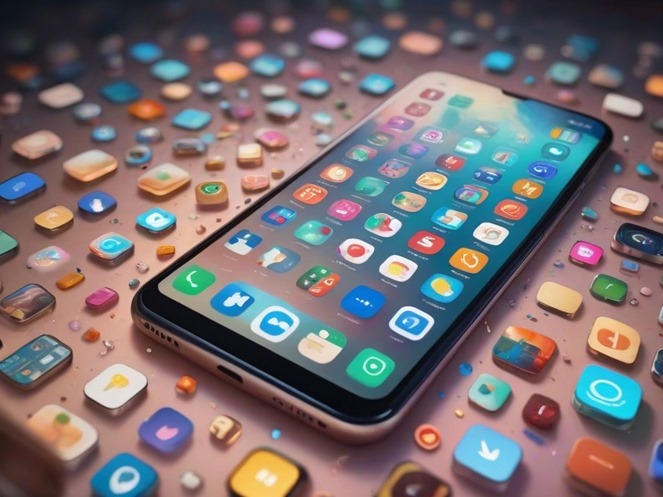
Have you noticed a shift in the way service providers operate? It seems as though every company is aggressively peddling their proprietary application—and often in areas where it's surprisingly or even shockingly unnecessary. Take for example, when you want to pay a service bill. Be it for gas, electricity or another regular household provision, suddenly you're being urged to download the company's app which, beyond the transparent promotional value for the company, serves little to no function for the process at hand. More...
by Dmitry Kirsanov
8. September 2023 21:36

Picture this: you've just wrapped up an extensive online meeting, your brain is swimming with all the information, and you wish someone (or something) could give you precise notes on everything discussed. Fear not, because today, I'll walk you through a futuristic way to get all your notes in a snap. And spoiler alert: It's not your trusty old pen and paper.
Lightbulb Moment: This process only requires your meeting's audio file. Got a video? No worries. We'll work with that too. And the wizardry doesn't end there; this method can pinpoint who said what purely based on the text. The future really is now. More...
by Dmitry Kirsanov
30. April 2019 11:28
Recently I analysed logs of some of my mobile apps, mostly enterprise with backend web services. And some thoughts that result from it are well worth sharing. That mainly concerns architects and developers of corporate apps, rather than game or standalone apps – network-related problems are harder to solve, as you don’t control the environment.
More...
by Dmitry Kirsanov
28. November 2016 11:33

It finally happened. My first app for Android platform is just about to be released and is available in Beta channel. It was clear that I’m not going to release anything for Windows Phone market anymore, especially since all phones in family are Android based, but I had to start somewhere in Android, and what a start it is!
The idea came during the Halloween night, when I was about to pick up the trick-or-treaters and their parents from neighbourhood. The problem was – it was night, I didn’t know where they are at the moment, and they were wandering among other spooky wanderers. I needed to know their location, precise and fresh. It took a few phone calls and messages with coordinates until I found them. Not a big problem, but I would rather get rid of that.
Second problem was recurrent – when I have to pick up someone using the car, I want to make sure that person knows my whereabouts, so neither of us would have to wait. Or when I want to show where I am, so family would know when to expect me. And that I’m fine and where I am supposed to be.
And a nuance – I never want this information to be available all the time. For various reasons – from privacy to battery life of my phone. I want to press the button, share my location, and for a limited time I want that location to be current. More...
by Dmitry Kirsanov
4. November 2016 20:25
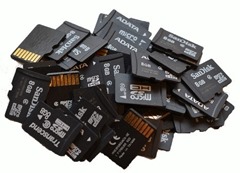 Phones get faster processors, more RAM, more capacity and capability to work with larger microSD cards. Phones like Samsung Galaxy S7 and HTC 10 can take microSD up to 2Tb large. The largest microSD card available in the market today is 256Gb.
Phones get faster processors, more RAM, more capacity and capability to work with larger microSD cards. Phones like Samsung Galaxy S7 and HTC 10 can take microSD up to 2Tb large. The largest microSD card available in the market today is 256Gb.
With faster CPU and higher resolution screens and cameras capable of writing 4K videos (like Samsung Galaxy S7 Edge camera, for example) comes the question whether the current cards support such speeds and whether you need to invest into higher speed card or resort to twice cheaper and slower one.
To make long story short – you don’t need the fastest microSD card. You can take any Samsung or SanDisk card and you’ll be fine. Read further for a longer story. More...
by Dmitry Kirsanov
8. September 2014 22:09
If you are curious enough to develop software for Windows Phone, Microsoft got few surprises for you, which you may or may not already noticed, depending from how often you publish your apps.
First and the most important change is that Microsoft stopped testing new apps. Completely. This improved the speed of application submission from 3-7 days to 10-20 minutes. No one is going to check your app for compliance to UI, security and usability guidelines, as Microsoft has way more serious problems to solve – abysmal market share of just 2.5% and huge gap in apps with Google Market. And high quality, as you know, is an enemy of high speed, unless is backed by increased budget. Since Microsoft doesn’t yet control your budget, all they could offer is to help the speed of submission by eliminating the quality fence.
The downside of this is lowered quality of apps. For example, I released an application, which successfully completed the certification and was published in about 15 minutes, but failed to even start. That’s right, it produced exception right on start, no welcome screen or splash. More...
by Dmitry Kirsanov
28. July 2014 11:15
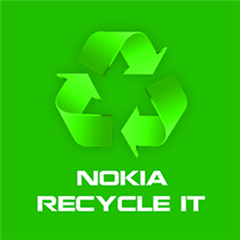 A year ago I started an experiment. I've got myself a Windows Phone. I wanted to see if I can be happy enough to keep is as a replacement for an Android phone, and whether I could develop anything that I would miss in that platform. And so I've got myself an HTC 8X.
A year ago I started an experiment. I've got myself a Windows Phone. I wanted to see if I can be happy enough to keep is as a replacement for an Android phone, and whether I could develop anything that I would miss in that platform. And so I've got myself an HTC 8X.
The phone itself, speaking about hardware, is pretty good. Apart from lack of microSD card slot and accidental restarts due to badly designed SIM slot, everything was perfect.
Pretty soon I realized, that things I could develop are either restricted by operating system, or would require support by third parties. So although I developed what I liked, it didn't really cover my user requirements, and with time I started to carry my old Android phone with me. Not to make calls, but simply for apps and internet for these apps.
A year later, I think it's time to draw the line and write down my experiences with Windows Phone. I think they might be interesting for you if you have no to little experience with Windows Phone and wondering what it's like and whether it’s worth trying.
First, here is a simple list of things that I, as a normal user, can and can not do with two mobile operating systems - Android and Windows Phone. Since this question is very popular and human memory is usually very slow, I decided to write down the points that justify me carrying an Android phone in a backpack. More...
by Dmitry Kirsanov
23. September 2013 06:40
 Finally, here comes the Windows 8 port for my Windows Phone 8 (and 7) currency converter published 3 weeks earlier.
Finally, here comes the Windows 8 port for my Windows Phone 8 (and 7) currency converter published 3 weeks earlier.
There was no real need for it, excerpt for the Microsoft’s challenge to create an application and get 100 installations by the end of September (so I still have a week!). Anyway, the result is good and even useful, which is quite unusual for Metro apps.
I have to operate 3 currencies on a daily basis, and therefore I have to use converter. But I wanted to get rid of advertisements and privacy issues. For example, the XE Currency converter, apart from usual advertisement, has a problem with privacy. For some reason it sends to its server a lot of irrelevant information, such as the model of my notebook. Why? I have no idea, but I didn’t like that.
So, when I had to create the first Metro app, the topic of choice was very obvious and not very original - the currency converter.
The saga of certification and myth busting (remember the “just copy your code to another platform and it works!” fairy tale?) will follow soon, but for now - Ladies and Gentlemen, you are very welcome to install and use the brand new free currency converter for Windows 8.
Here is the link to Windows Market: https://byte.lv/Z
by Dmitry Kirsanov
1. September 2013 08:33
 It finally happened - I am releasing my first application for Windows Phone 8. And Windows Phone 7.1, for a change. Taking into account the average (in all meanings of that word) quality of applications in Windows Phone Store, I should be proud of myself.
It finally happened - I am releasing my first application for Windows Phone 8. And Windows Phone 7.1, for a change. Taking into account the average (in all meanings of that word) quality of applications in Windows Phone Store, I should be proud of myself.
If, by chance, you own a Windows Phone device, and in need of a currency converter for Windows Phone, I highly recommend this app, as it’s the most advanced one in the store at the moment, and will become even more useful in time.
Here are the few images of it that you can also see at the store:
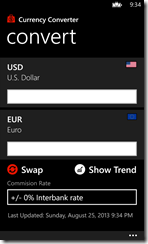
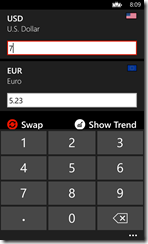
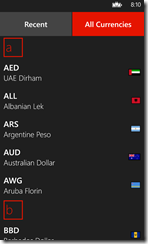
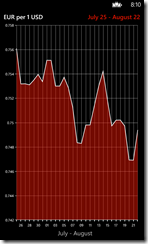
I really like how it looks and works so far. Planning to release its Windows 8 analogue in a few days.
If you are planning to give it a try, let me know what you think and what else you’d like to see in it. Your feedback is important!
by Dmitry Kirsanov
16. November 2012 22:34
New technologies allow us to reach new goals. Different tool sets enrich scenarios and it becomes easy to do things we couldn’t dream about before. We implement features so fast, that sometimes we just can’t analyze the impact until the most loyal customers uninstall our app.
Once upon a time I’ve downloaded the mobile application which made my phone a toy that could be handed to a kid. Just like the Kid’s Corner in Windows Phone 8, but for Android. It contained a few badly written games, but it was not the reason why I uninstalled it.
In Android, just like in Windows 8, you can use other apps to enrich your application with their services. Connect to social networks, send e-mails and whatever else.
What this particular application did – it used my e-mail application to send e-mail to developer of that application, to automatically register me as it’s user. I realized that only when I’ve received an e-mail with the password and warm “thank you” for registration which I didn’t commit or solicit.
In some countries that’s crime which could cost you your business.
The morale is – sometimes you can’t do what you can do. You can use contracts in Windows 8 (or their analogs in Android and iOS), but you shouldn’t do anything that your customer is not aware of and can’t cancel before it happens.